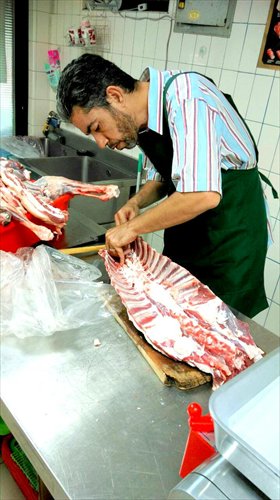Halal hopes
Local governments’ desire to increase food exports to world’s Muslim markets face challenges of certification and quality control

Two dancers holding nang (traditional Uyghur flatbread) at a halal food festival held in Xinjiang Uyghur Autonomous Region in 2012. Photo: CFP

A chef slices mutton at a Muslim restaurant. Photo: CFP
From adding Muslim workers to their production lines and changing their ingredients, to expanding production capacity, companies in China are aiming to enter the global halal food market. Local governments are also hoping to jump on the Belt and Road initiative to develop inland regions. But hurdles like halal food certification and food quality control still need to be overcome.
When Ali Mueen, second secretary of the Maldives embassy in China, first came to Beijing a few months ago, he was worried most about the food.
He didn't know if he could get genuine halal food in a non-Muslim country. In fact, he brought over 80 percent of his day to day food from the Maldives. But when he traveled to Northwest China's Ningxia Hui Autonomous Region last week, he said his concerns disappeared.
Last week, Mueen spoke at the International Development and Investment Forum on Halal Industries under the Belt and Road Initiative held in Wuzhong, Ningxia during the 2015 China-Arab States Expo. Local government officials and experts also attended the forum to discuss how to help Ningxia's halal industries reach the international market.
For years, local governments have been trying to help Chinese businesses enter the international halal food market. China has a Muslim population of about 20 million and Ningxia has 2.5 million, second only to the Xinjiang Uyghur Autonomous Region. Local authorities saw this as an opportunity for development, especially after the Belt and Road initiative was brought forward.
However, despite government and enterprises' efforts, halal food producers still face major hurdles in getting their food onto foreign plates, such as the difficulty of getting recognized halal certification, and widespread worries about the quality of Chinese food.
Local push
Zhao Yongqing, secretary of the Wuzhong Party Committee, told the Global Times that the day after President Xi Jinping announced the initiative in Kazakhstan in 2013, he started thinking about how it could benefit the city of 1.3 million.
"Fifty-three percent of the population of Wuzhong are of the Hui ethnicity (the majority of whom are Muslim)," Zhao said. "For more than 400 years, Wuzhong served as an important stop on the ancient Silk Road and developed a Muslim community."
Right now, the halal industry in China is a minor player on the world stage. According to experts, the global volume of trade in halal food in 2009 is $150 billion, while China's exports of halal food that year amounted to $100 million, less than 0.1 percent of the entire volume. In 2013, the world's trade volume of halal food reached $500 billion, and Chinese firms made up less than 0.5 percent of the total.
Furthermore, halal food exporting companies are concentrated in China's coastal provinces. There are more than 110 halal food companies in South China's Guangdong Province, 50 companies in East China's Jiangsu Province and more than 30 companies in Beijing. But in landlocked areas that have major Muslim populations like Northwest China's Qinghai Province and Ningxia, there are only a few companies with the capacity to export significant amounts of goods.
In the last few years, Ningxia's regional government and local governments have tried to encourage the development of halal companies with favorable policies.
In a 2011 document, the Ningxia government stated that halal industries should enjoy official financial support and small loans. Companies can receive up to 30 percent of their funding for innovation and sales projects, or for talent training from the regional authorities. They can also receive a one-time cash award for high production or other achievements.
In 2012, a halal food industrial park was built in Wuzhong. Right now, 218 companies operate in the park, including some famous Chinese food production giants. The government has focused on growing the park's capacity to produce large quantities of halal foods such as dairy, meat products, seasonings, and juice.
Ma Li, vice chairman of the Ningxia government, told the Global Times that he thinks Ningxia's own platform isn't large enough for developing the industry. The Belt and Road strategy must be incorporated, he said.
"In the grand strategy, the China-Arab States Expo is also an important platform that can bring forward the export of Islamic products all around the country. The Europe-Asia Expo in Xinjiang is another one," he said.
Adapting to the market
Many ambitious Chinese companies have already been aiming at the halal food market; even companies which aren't traditionally producers of halal goods have been seeking to profit from the appetites of the over 1 billion Muslims in the world.
In 2012, China's juice giant Huiyuan started cooperating with halal pastry company Xiangjuzhai Foods, and established a new company dedicated to making halal juice.
In order to make products follow the religious rules of halal and obtain certification, the company made changes to its production methods. For example, it employed Muslim workers in both management and production posts, Wang Meng, the company CEO, told the China Food News.
"At the end of every procedure in making juice, there's a Muslim employee watching over the quality of the product and making sure it strictly follows halal regulations," he said.
More importantly, the ingredients of certain products have been altered. Traditionally when producing juice, many companies have added gelatin to thicken the juice. But gelatin is made from animal bones and skin, including that of pigs', and the resulting drinks are not halal.
These of standards also became a selling point for Huiyuan to market its goods to non-Muslim consumers, as they argue that the high standards they have put into place to produce halal products prove that the company can avoid the all-too-common food safety scandals and produce healthy and organic juice.
Other companies also stress that their halal foods aren't only for Muslims. They hope to push the concept that these foods are cleaner, purer and are made with higher food standards.
With this concept in mind, governments started their push towards expansion.
Zhao Liting, director of the investment attraction division of Wuzhong's Litong district government, told the Global Times that the district government decided to expand a local market this year. A project has been approved by the government, although construction hasn't yet started.
Litong's market was established in 1990. Many small businesses sell mutton and beef there and over the years it's gradually become the biggest halal meat market in Wuzhong. An average of 5,000 sheep and cow farmers work in the market and it has established partnerships with more than 20 provinces in China.
Up till 2011, Litong district had 183 companies producing halal foods and Islamic products. But as of now, their production capacity has remained small and aimed at the local market.
"Most of these companies are small-scale," Zhao said. "This may limit the development of the halal food industry in the region."
So the government proposed a production park, with more than six processing lines for mutton and beef.
According to the local government's website, after the production park is built, an annual total of more than 8,000 tons of beef and mutton is expected to be produced, with an estimated value of 400 million yuan ($63 million).
Hurdles to jump
However, even local governments who have developed ambitious plans admit that many difficulties lay ahead.
A major obstacle to exporting halal food is getting internationally recognized certification which can put customers' minds at ease about the authenticity of a firm's halal production methods.
Most Muslim countries have had a sound certification system for halal food since the 1970s and recognize each other's certification standards, while China has yet to lay out a nationwide halal food certification system.
Zhao explained that Ningxia established China's first halal food certification center - the Ningxia Halal Food International Trade Certification Center - in 2009.
He said the center now offers certifications to over 100 companies and has established a mutual recognition of halal food standards with seven countries, including Malaysia.
"Some countries have used the certification system as a trade barrier to prevent Chinese companies entering their markets," Ma Bing, director of the Ningxia certification center, told the Global Times in a previous article.
Another issue is food safety. Gao Zhanfu, vice dean of the Beijing-based China Islamic Institute, said there shouldn't even be talk of developing the halal food industry if China can't make sure all products sold as halal are genuine.
"I've read that some mutton produced in Gansu Province had pork in it, and that a halal cake shop in Xining, Qinghai Province put some pork in its goods," he said. "Making sure safety of halal food is the most important thing in developing the entire industry."